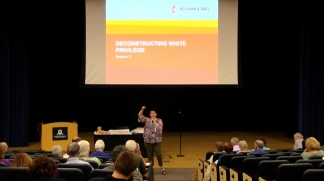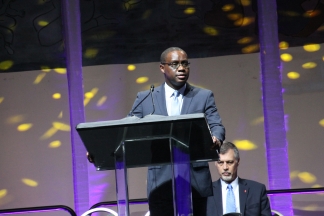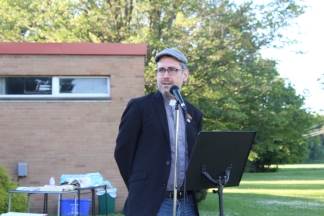news article
Upper New York’s Imagine No Racism initiative off to a great start
July 13, 2018 / By Shannon Hodson / .(JavaScript must be enabled to view this email address)
Editor’s Note: In July of 2016, the Northeastern Jurisdiction of The United Methodist Church unanimously approved a resolution for every Annual Conference to confront the sin of racism in their own hearts, churches, and communities. Upper New York Area Resident Bishop created a taskforce, known now as the Bishop’s Taskforce on Eliminating Racism, to strategize ways to confront this deeply embedded issue across our Conference. The taskforce worked together to form the Imagine No Racism initiative. The following article features what the hundreds of UNY Conference members participating in the initiative have been up to since the imitative was lunched in April of this year.
“The work of eliminating racism is ours to do. It starts within ourselves – it spreads beyond ourselves into the lives of others and throughout the structures of our society. We have been called to stand against the sin of racism. May we be bold! May we be courageous! May we trust God to encourage us, challenge us and equip us for this journey of justice!” These are the words of Upper New York Area Resident Bishop Mark J. Webb in an introductory video to the Imagine no Racism initiative that is taking place throughout the Conference.
Imagine no Racism (INR) was launched on April 21, 2018. Click here to read more about the launch day. You can also use a study session based on the launch day. Click here to view the session.
Each District has created small groups who have committed to meeting six times over the next six months to ultimately understand the sin of racism so that work can begin work toward it. The six sessions are from a curriculum developed by the General Commission on Religion and Race (GCORR). Additionally, each District has an INR Advocate to assist small groups and there are also four Regional Advocate throughout the Conference to offer support.
Before the small groups delved into their sessions, they received a day-long training from GCORR. Blenda Smith, chair of the Conference Commission on Religion and Race (CCORR), and a member of the Bishop’s Taskforce on Eliminating Racism said “The INR training was for facilitators (leaders) of small groups. We also encouraged District Advocates and Regional Coordinators to attend. The training walked the attendees through the six sessions and how to guide them. It also gave guidance to potential concerns that might come up.”
Small group leaders, District Advocates, and Regional Coordinators all provided positive feedback about the GCORR training day.
Dr. Scott Johnson, a small group leader in the Niagara Frontier District, said, “I thought the training laid a strong foundation for the upcoming conversations. The dialogue about the different types of racism and the truths of privilege provided important knowledge and a broader perspective that will help the groups as they discern new ways of working for racial justice.”
Pastor Brian Lothridge, the District Advocate for the Mohawk District, said, “I thought the GCORR training was very helpful in learning how to teach the curriculum. I went as a District Advocate but have found myself co-leading one of the groups with Pastor Pat Hubman in the Mohawk District.”
Nancy Raca, a Regional Coordinator for the Finger Lakes, Binghamton, and Mountainview area said, “The GCORR training was indispensable for anyone leading an INR small group this year. The presenter did a great job explaining the goals of the curriculum and answering questions from the audience.”
According to the GCORR curriculum, “The goal of Imagine No Racism is for churches and connectional organizations within the Conference to show a real increase in mission and ministries that impact racial justice in churches and communities…this is not simply a means to an end. Rather GCORR created this series to provide a starting point for the long-term work of disrupting and dismantling racism.”
The study sessions for small groups are designed in such a way that enables active discussion among all group participants no matter their experience with resisting racism. There are discussion questions written for three different anti-racism experience levels:
- There are introductory questions for people who are just beginning the work of resisting racism; people who may not have heard anything about race/racism at church and/or the pulpit.
- There are what’s next questions for people who have started the work of resisting racism; have probably been to workshops, engaged in conversations about race/racism some of which may have happened at their church; have heard sermons addressing race/racism; don't know how to take next steps on their own & find themselves asking, "what's next?"
- There are also veteran questions for people who have been doing this work for a long time and may have facilitated workshops; are able to think of next steps on their own but may feel like they have already tried everything and are getting burnt out; People of Color who, by necessity, resist racism their whole lives regardless of ever having been to a workshop.
Using these guidelines, several small groups have been meeting across the Conference. Most groups have completed the first session and have had time to reflect on it.
The first session approached racial justice from a theological standpoint based on John Wesley’s three simple rules to do good, do no harm, and stay in love with God. Each small group participant was asked to sign a group copy of these rules to indicate they agree with the rules and will follow them.
Pastor Lothridge found the first session helpful; he said, “I find the theological underpinning of this curriculum to be helpful. I don’t know that many people connect racism to their faith. This curriculum shows how racism is contrary to our calling as followers of Jesus Christ.”
Overall, the INR initiative is off to a great start! Small group leaders are taking initiative and upholding their commitment to meet regularly and follow the GCORR curriculum. Nancy Raca said, “Groups meet in restaurants, churches, District offices…anywhere that is convenient for their members to get together and share. Overall, it seems the curriculum has been well received so far.”
To learn more about INR and how you can participate in this initiative, visit imaginenoracism.org.

